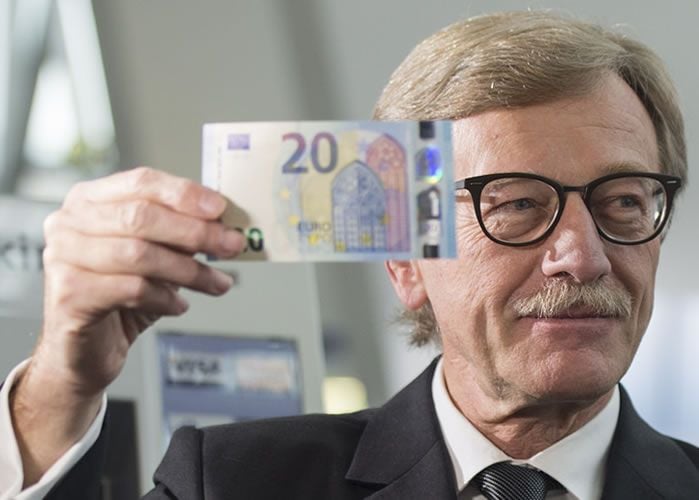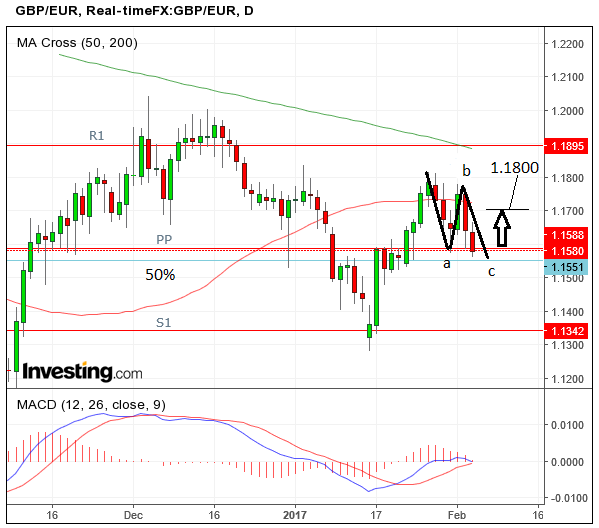Pound Forecast to Advance on the Euro this Week But Longer-Term Strength Seen as Limited

Pound Sterling has edged above 1.16 against the Euro having found buying interest at a noted pivot level.
Buyers have been seen entering the market and buying Sterling for two days in succession around the 1.1570 level and ensuring the downside is protected.
We have noted that this level has historically been a point of interest for the traders stretching back to November 2016:
We have found weakness has often ended at this point as buyers step in while any strength taking the exchange rate up into this level has often been met with selling interest.
Therefore, as we are moving down into the support zone, we would expect to find some strength on a temporary basis.
Pound Sterling's young recovery brings to a close a rough few days for Sterling which tumbled after the Bank of England communicated to markets in their most recent Quarterly Inflation Report that they are not willing to raise interest rates in the foreseeable future.
However, we wrote ahead of this new week that we favour a rebound in Sterling strength, and trade on Monday and Tuesday has been broadly supportive of our view.
In addition to noting the strong buying interest at 1.1570, further studies suggest the pull-back from the 1.1800 highs looks to be a three-wave a-b-c correction which is probably complete.
The correction moved back 50% of the previous move, which is a significant Fibonacci retracement level where corrections often finish before the exchange rate resumes its trend higher.
The monthly pivot – a level used by traders to fade the trend – is close to the lows at 1.1589 and is likely to prove difficult to break beneath, also increasing the likelihood of a resumption higher.
If the pair rotates at these robust support levels and moves higher than a break above 1.1700 would confirm a continuation up to 1.1800.
But, Any Sterling Strength Still Likely to be Limited Longer-Term
The Pound weakened in early February after the Bank of England (BOE) revised up growth forecasts but kept inflation forecasts unchanged while communicating no interest rate rises are likely in the foreseeable future.
The UK economy is not generating its own 'organic' inflation through wage hikes - and it is this inflation that the Bank will react to.
Until global investors get a sense that UK interest rates are to rise they are unlikely to buy Sterling.
The Bank's projections, and the Pound's continued underperformance thanks to uncertainty concerning Brexit have kept - and are likely to keep - the Pound subdued.
“We confirm our expectations for a possible – albeit modest – weakening of the Pound in the near term, mostly due to the new phase of uncertainty that will begin once the Brexit process is officially triggered,” says Luca Mezzomo, an analyst with Intessa Sanpaolo.
On this front, a three-day debate on a law giving May the right to trigger Britain's exit from the European Union begins on Monday, and will be followed by a series of votes on whether to attach extra conditions to her plan to start talks by March 31.
Important amendments to the Bill will be discussed during debates leading up to the vote on Wednesday, which could impact how ‘Hard’ or ‘Soft’ Brexit could be.
One proposed amendment would be to discuss whether the UK should exit the common market as well as the EU before withdrawing.
Another asks for Parliament to be regularly updated by the government on the, “advancement of the negotiations".
Parliament may ask for further powers, including the power to vote to approve the agreement after negotiations are completed with the EU - and to extend negotiations in order to reach a better agreement.
Then there may also be amendments to protect the right of EU citizens living in United Kingdom and the request for an assessment of the impact of Brexit on specific sectors, such as climate change, social inequality, and public finance.
Once the vote in the Commons is passed the House of Lords will have their turn to debate and vote on the Bill on February 20.
It is then expected to be implemented on March 7.
Keep an eye on headlines - if there are signs Parliament is gaining an upper hand, and winning concessions we believe it would be positive for Sterling and with the currency under so much pressure we would argue risks are to the upside.
However, David Johnson at Halo Financial, a foreign exchange brokerage, believes the markets are unlikely to be rocked by happenings in parliament with much of the news already incorporated in the price:
“We won't learn much from the White Paper; and the opposition has committed to vote for the triggering of the exit plans, so other than a bit of showboating and grandstanding, I doubt we will see much volatility driven by MPs.”
Data to Watch
From a data perspective, the big release will be Manufacturing and Industrial Production on Friday, February 10, at 9.30 GMT.
Analysts estimate a downtick to 0.4% from 1.3% previously for Manufacturing, and Industrial Production slowing to 0.2% from 2.1% in December.
The Trade Balance, also released on Friday is expected to show a narrowing of the Deficit to -11.4bn from -12.16bn in December.
The Eurozone: No Support from the ECB's Draghi
The Euro continues steadily appreciating as it reflects an equally slow but steady improvement in economic data.
Last week saw the release of better-than-forecast PMI’s which helped further boost the outlook for the economy and the currency.
However, the Euro has failed to really take off as the all-important European Central Bank (ECB) is yet to be convinced they will need to cut back on their stimulus programme.
The lack of traction in Core Inflation, is keeping European Central Bank officials cautious and guarded with both President Draghi and Benoit Coeure saying they did not think the conditions had yet been met for a change in policy direction.
On Monday January 6 ECB President Draghi struck a particularly dovish tone today in a speech delivered at the joint ECB and Banka Slovenije conference on the occasion of the 10th anniversary of the adoption of the Euro by Slovenia.
Draghi reiterated that while the Eurozone’s headline inflation may have picked up, the underlying CPI readings remains muted, meaning that for the time being the region is still in need of the stimulus being pumped into it every month.
Draghi's refusal to consider tightening monetary policy lead to a sharp move lower for the Euro.
"The recent rise in Eurozone inflation had many wondering whether we would soon see an end to the ECB’s expansionary stance, yet by disregarding inflation as largely energy driven, Draghi has essentially promised to maintain and even extend QE for a while yet," says Joshua Mahony at IG in London.







